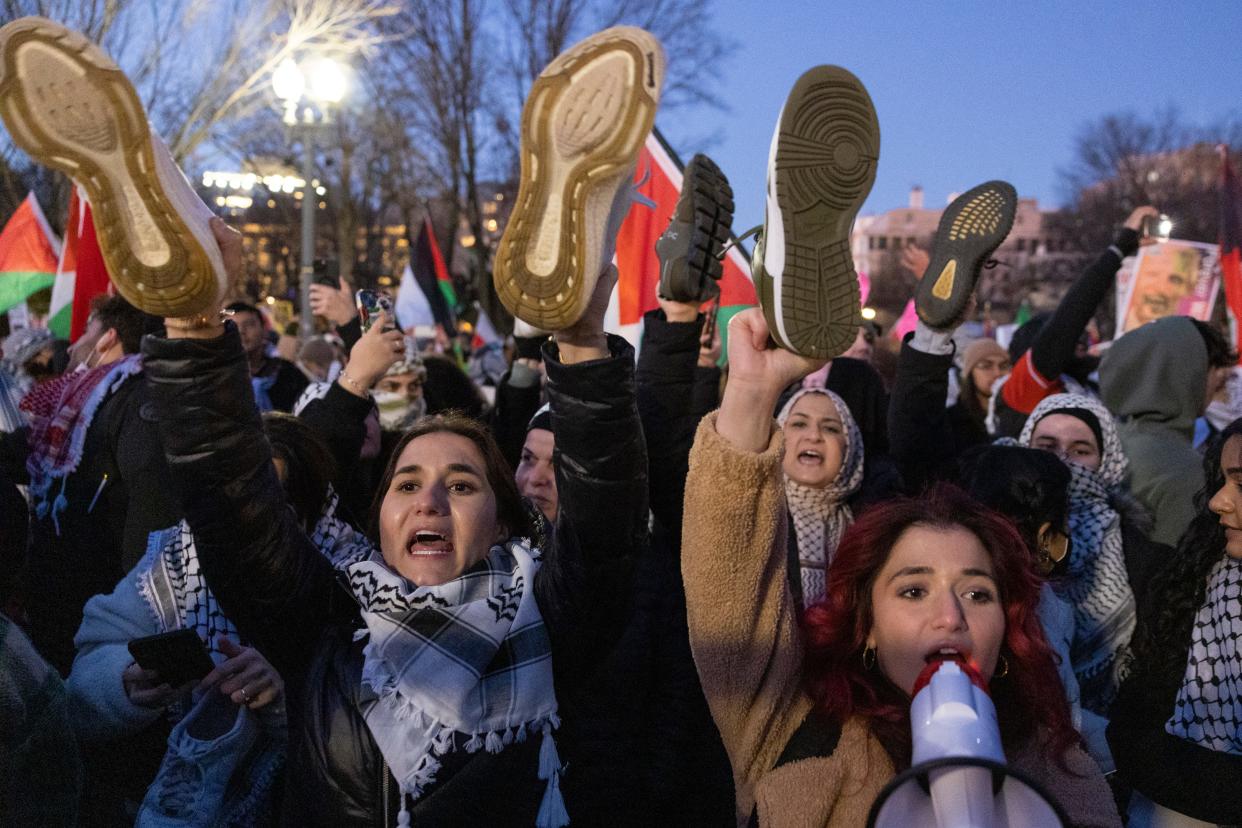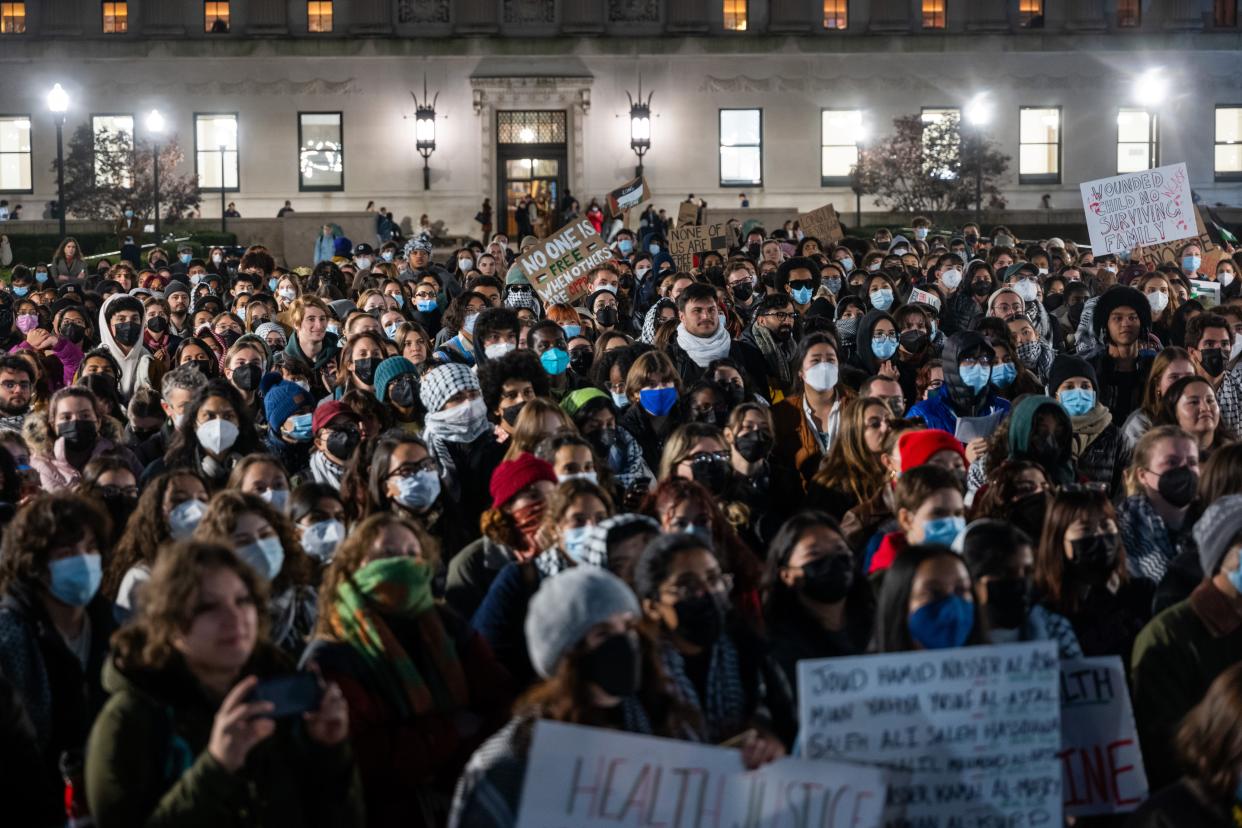Gen Z and their elders are split over the Israel-Hamas war. Why is that?
Ciara Hernandez has watched the war in Gaza unfold on Instagram. In live videos, she has seen children suffering massive burns and crushed limbs, families digging with their hands through rubble to find buried loved ones, bombs striking schools and homes.
“It has been really heartbreaking, to be honest,” said Hernandez, 23, of Union City. “I think I've cried every day.”
Moved by these videos, Hernandez joined masses of young people who have marched and rallied in the streets and on college campuses for a cease-fire in the Israel-Hamas was. She is part of Generation Z, those born after 1996, a group whose activism underscores a growing generational divide in political views over the Israeli-Palestinian conflict.

The divide pits older Americans, whose historic support for Israel continues today, and a younger generation that sees the pro-Palestinian movement as a fundamental progressive cause. Social media is helping to drive support for Palestinians, even as critics say it does not offer a full picture of the conflict. Changing demographics and a shift in historical narratives about Israel and Palestine are also shaping views on the conflict.
Gen Z gets news primarily from social media
Hernandez has followed online accounts of social justice activist Shaun King and journalist Motaz Azaiza, among others, for information about war in Gaza. Unlike previous conflicts, the tech-savvy generation is seeing the horrors of war play out in real time on their small screens. They also hear political messaging from social media influencers about the conflict.
Nearly 70% of Americans ages 18 to 29 said they turned to social media for news coverage in a 2023 Pew Research Center survey. Baby boomers were far more likely to rely on television and print media for political news, the survey found.
Critics say videos and information shared on Instagram, Twitter and TikTok offer short, one-sided narratives devoid of context or nuance. A post may focus on the 26,000 Palestinians killed in Gaza but omit mention of the Oct. 7 Hamas attack that killed 1,200 Israelis and triggered the war. Another post may focus on 240 hostages taken by Hamas, but not on the growing number of Palestinians detained without charges.
Algorithms, the equations that individualize social media feeds, show people content that aligns with their political views. Many young people lack awareness about how social media manipulates what they see, said Irina Raicu, director of the internet ethics program at the Markkula Center for Applied Ethics at Santa Clara University.
“They see these bits, these short posts,” Raicu said. “They are often posted by people who don’t claim to have kind of objectivity that at least straight news media outlets try to have. They are thinking that they are seeing reality, rather than thinking it’s part of a very painful or complicated conflict.”
“If you are reading Tweets about people from Gaza or posts from families of Israeli hostages, you will get something different,” Raicu added. “It does add to the picture, but it has to be consumed carefully.”
Social media provides a place for Palestinian voices often overlooked in mainstream media, at a time when Israel has barred foreign reporters from Gaza, said Joanne Carducci, a New Jersey-based media commentator. International media has also used social media reports for tips.
But it is also a place where uniformed influencers and “bad actors” spread false information online that "spreads like wildfire and it becomes accepted as fact," Carducci said.

“What we see right now happening on social media, particularly on TikTok, is so concerning to me because it’s a bunch of people who should not be trusted sources, resources or voices on this incredible intricate, difficult hotbed tinderbox of an issue,” said Carducci, who herself is a social media influencer who goes by JoJoFromJerz.
“People are choosing to press down and compact this issue, and people are ready to explode. I would ask them, if you’re not an expert, really, please try not to frame yourself as one. And make sure your facts are vetted and correct if you are going to put stuff out there.’”
Nika Abudkadyrova, 19, of Marlboro, said the first-hand reports she sees on social media feel more trustworthy than what is presented in mainstream media.
“We see it in front of our faces all the time,” she said. “Whether we are looking for it or not, we see what is happening. We can’t be lied to or convinced, because we see what’s happening.”
“It just feels like common sense at this point, when you see a country bombing civilians. Whatever the reason they try to tell, I don’t believe it. You don’t do that, not for any reason.”
Gen Z is diverse and shaped by the experiences of peers
In interviews, young people said their views were also shaped by experiences of their peers and friends in what the Pew Research Center has identified as the most racially and ethnically diverse generation.
Wolfgang Smith, a Montclair State University student, heard from a fellow student about hardships her family faced living under Israeli occupation. An aspiring art teacher, Smith also worked with young students who doodled “Free Palestine” in their journals.
“When I saw what these kids who were like 13 were doing,” Smith said, “it made me interested in like what's going on. I started reading more about the history, especially the U.S.'s involvement with Israel.”
Smith and a friend, Tatania Valentine, said social media was not their only source of news. They also listen to podcasts, as do an estimated 41% of Gen Z, according to the Pew survey. They followed independent outlets like The Intercept and the news show, Breaking Points, on YouTube.
The Montclair students said they viewed the Palestinian cause as an extension of the racial justice movement that followed the police killing of George Floyd in 2020. Activists have rallied around what they believe are common struggles against police brutality and colonialism — a comparison Israel advocates reject as false, noting that Jews also have historic ties to the region.
Gen Z’s diversity has been key in changing how they feel about politics, said Gabriel Rubin, professor of Justice Studies at Montclair State University. “People say their roommate is Arab or their friend is Arab," he said. "They don’t just hear a story from one side."
Changing narratives also fuel a generational divide on Israel
In a November Quinnipiac Poll, two-thirds of voters under 35 said they disapproved of Israel’s response to the Oct. 7 Hamas attack. About half, 52%, said they have greater sympathy for Palestinians in the conflict.

Among baby boomers, 57% said they approved of Israel's response, while just 15% said they were more sympathetic to Palestinians. Surveys by Yahoo! News and New York Times/Siena College have shown similar divides in political views by age group.
Differing perceptions and narratives about Israel are fueling the divide. Older generations grew up in the shadow of the Holocaust and terror attacks, and viewed Israel as an underdog and a benevolent democracy.
Younger Americans have grown up with an Israel that has moved rightward, with ultranationalist leaders in power and a harsh military occupation in Palestinian territories. They saw a wave of social media reports in 2021 in protest of West Bank home evictions.
“If you’re 20 years old,” Rubin said, “you didn’t live through the peace process in the '90s where there was some hopefulness in that region. You basically have only seen [Benjamin] Netanyahu as prime minister in Israel. You have only seen settlement expansion in the West Bank and violence. You’ve only seen wars in Gaza.”
“It’s not the same conflict than it was in '60s, '70, '80s, '90s, where perhaps people were saying Israel is a new country and they are fighting for their lives, and they are moral, and they want what is good.”
The generational rift over Israel also impacts American Jews, who are divided within households over Israel's actions, Rubin said. The divide was highlighted in a 2021 poll by the Jewish Electorate Institute, which found younger Jews more likely to agree with sharp criticisms of Israel than older Jews.
With age comes experience. With youth comes progression
Senator Chuck Schumer, the majority leader and highest-ranking Jewish member of Congress, emphasized the trauma and displacement that Jews have historically faced during a speech on antisemitism in November.
"Too many Americans, especially in our younger generation, don’t have a full understanding of this history," he said on the Senate floor.
There are people who view them as "oppressors," he said, but Jewish Americans feel any strength and security "can all be taken away in an instant," said the 73-year-old senator.
"Learn the history of the Jewish people, who have been abandoned repeatedly by their fellow countrymen — left isolated and alone to combat antisemitism — with disastrous results," Schumer said.
Young Democrats have expressed their concerns that President Joe Biden’s support for Israel in this war could cost him votes. In November, progressive Gen Z groups including March for Our Lives, Gen-Z For Change and the Sunrise Movement penned an open letter to Biden.
“Young people are disappointed with the way this administration is upholding a far-right government and providing resources to a far-right government and is aiding and abetting a genocide,” Michele Weindling, political director of Sunrise Movement, said in an interview.
They want the administration to focus on crises at home including student debt, mass shootings and climate change, Weindling said. She added, "We are watching as the administration leads on pro-war policy and feeling incredibly disheartened."
This article originally appeared on NorthJersey.com: Israel-Hamas war perspectives sit on a generational divide. Here's why
